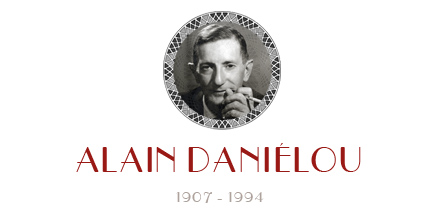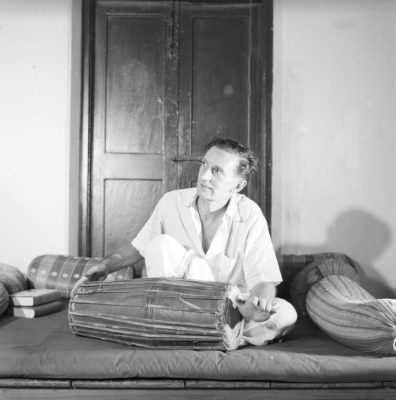Alain Daniélou was born at Neuilly sur Seine (Paris) on October 4th 1907.
His mother, Madeleine Clamorgan, descended from an old and noble Norman family. She was an ardent catholic and founded a French religious order, as well as the famous “Sainte Marie” teaching establishments. His father was a Breton politician, an anti-clerical, and was several times Government minister. Alain Daniélou’s brother took clerical orders and was made a cardinal by Pope Paul VI. Alain Daniélou spent most of his childhood in the country, with tutors, a library and a piano. During these years, he discovered music and painting.
He then left France to attend an American school at Annapolis, where he earned pocket-money by selling his paintings and playing the piano at silent movie theatres. On his return to France, he studied singing under the famous Charles Panzéra, as well as classical dancing with Nicholas Legat (Nijinski’s master), and composition with Max d’Olonne. He gave recitals and exhibited his paintings.
A keen sportsman, Alain Daniélou was a canoeing champion and an expert driver of fast cars. In 1932, he made a trip to explore the Afghan Pamir, and, in 1934, an endurance test by car from Paris to Calcutta. In between, he stayed with Henry de Monfreid at his fief of Obock on the Red Sea. Between 1927 and 1932, he met Jean Cocteau, Jean Marais, Serge Diaghilev, Stravinsky, Max Jacob, Henri Sauguet, Nicholas Nabokov, Maurice Sachs, etc. and took part in the artistic effervescence of the period. Together with the Swiss photographer, Raymond Burnier, he then departed for the East, travelling in North Africa, the Middle-East, India, Indonesia, China and Japan. He finally established himself in India, initially with Rabindranath Tagore, who entrusted him with missions to his friends (Paul Valéry, Romain Rolland, André Gide, Paul Morand, Benedetto Croce) and appointed him director of his school of music at Shantiniketan.
Following this period, Alain Daniélou then retired to Benares, living in a mansion on the banks of the Ganges (Rewa Kothi). At Benares, he discovered the traditional culture of India, into which he was gradually initiated. He was to stay there for fifteen years. He studied classical Indian music with the prestigious master Shivendranath Basu, and learned to play the vina like a professional. He also studied Hindi, which he spoke and wrote fluently as his own mother- tongue, Sanskrit and philosophy, with masters who were among the highest authorities of tradition. He was introduced by them to the famous Sannyasi, Swami Karpatri, some of whose writings he translated. Karpatri initiated him into the rites of Shaivite Hinduism, under the name of Shiva Sharan (protected by Shiva).
In 1949, he was appointed professor at the Hindu University of Benares and director of the College of Indian Music. He corresponded with René Guénon about the philosophic and religious approaches of Shaivite Hinduism.
Greatly interested in the symbolism of Hindu architecture and sculpture, of which he made a thorough study, he made long trips together with Raymond Burnier to Khajuraho, Bhuvaneshvar, and Konarak, as well as to many lesser-known sites in Central India and Rajputana.
In 1954, he left Benares to take up the post of director of the Adyar Library of Sanskrit manuscripts and editions at Madras. In 1956, he was made a member of the Institute Français d’Indologie at Pondicherry, and subsequently of the Ecole Française d’Extrème-Orient, of which he had been an honorary member since 1943. Being involved with those who were fighting for the departure of the British, as also with the Nehru family (in particular Mrs. Pandit, Nehru’s sister), the poetess Sarojini Naidu and her daughters, his sympathies lay with the independence movements.
After the independence of India, however, when the new government attacked orthodoxy, it was suggested that his role would be more useful in the West in presenting the true face of Hinduism. He thus returned to Europe and, in 1963, with the help of the Ford Foundation, created the International Institute for Comparative Music Studies, in Berlin and Venice. By organizing concerts for the great musicians of Asia and by publishing record collections of traditional music, under the aegis of Unesco, he played an major part in the West’s rediscovery of Asian art music. For artists like the violinist Yehudi Menuhin, or the sitarist Ravi Shankar, his work was decisive for the recognition of India’s classical music, nor just as folklore as it had been classified up to then, but as a great and masterly art in the same right as western music. He has published seminal works on religion (Hindu Polytheism/The Myths and Gods of India), society (Virtue, Success, Pleasure and Liberation, The four Aims of Life, The Kama-Sutra), music (The Ragas of Northern Indian Music, Music and the Power of Sound), sculpture and architecture (Visages de l’Inde Médiévale, Le Temple Hindou, La Sculpture Erotique Hindoue, L’Erotisme Divinisé), tales (Tales from the Ganges, Tales from the Labyrinth), a history of India, and a book on Yoga. His double but by no means synthetic culture gave Alain Daniélou an outsider’s view of the Western world, which may sometimes surprise. In two of his works, Gods of Love and Ecstasy, The Tradition of Shiva and Dionysus and While the Gods Play – Shaiva Oracles and Predictions on the Cycle of History and the Destiny of Mankind, he deals with the problems of a Western culture that has gone astray, having lost its own traditions and estranged man from both nature and the divine. He demonstrates that the ancient rites and beliefs of the Western world are very close to Shivaism and can be clearly explained with the aid of the texts and rites existing in India. His double but by no means synthetic culture gave Alain Daniélou an outsider’s view of the Western world, which may sometimes surprise. In two of his works, Gods of Love and Ecstasy, The Tradition of Shiva and Dionysus and While the Gods Play – Shaiva Oracles and Predictions on the Cycle of History and the Destiny of Mankind, he deals with the problems of a Western culture that has gone astray, having lost its own traditions and estranged man from both nature and the divine. He demonstrates that the ancient rites and beliefs of the Western world are very close to Shivaism and can be clearly explained with the aid of the texts and rites existing in India. Many of his works have been published recently, in particular the translation of the Tamil novel Manimekhalai, The Dancer with the Magic Bowl, a set of Italian short stories, Tales from the Labyrinth, a work on the Phallus Cult and his complete translation of the Kama Sutra, which was published in 1994 with great success. Most of his books are published concurrently in the U.S. , including his memoirs, The Way to the Labyrinth : Memoirs from East and West. Also ready for publication are eighteen Songs by Rabindranath Tagore (Original Bengali texts and melodies). Transcription, translation and Piano arrangement of the same are all by Alain Daniélou. In 1987, on the occasion of his “four-score years”, Paris fêted him, organizing a show in his honour at Espace Pierre-Cardin on the Champs Elysées, in the presence of the Director General of Unesco and numerous friends from the world of art and culture. In his latter years, Alain Daniélou resumed his painting activities, and his water- colours were regularly exhibited in Paris.
Alain Daniélou collaborated as musical consultant for several films, including one by Roberto Rossellini (documentary on India), and by Jean Renoir (his great classic “The River”) Extracts from his recordings have been used by many film directors, choreographers (Béjart for Bakthi and other works), and on television and radio in many countries.
Three video programmes have been produced: La Voce degli Dei by the Televisione della Svizzera Italiana (Lugano, 1995), Shiva Sharan by A.M.Masquin (Paris 1987) and the literary programme Apostrophe (INA, Paris 1981).
Alain Daniélou was a Officer of the Légion d’Honneur, Officer of the Ordre National du Mérite, and Commander of Arts and Letters. In 1981, he received the Unesco/CIM prize for music, in 1987 the “Kathmandu” medal from Unesco. He was an honorary member of the International Music Council, honorary chairman of the Institutes of Music in Berlin and Venice, and was elected “Personality of the Year” in 1989. In 1991 he was awarded the Cervo Prize for new music and in 1992 he was appointed member of the Indian National Academy of Music, Dance and Theatre, in the same year being appointed Emeritus Professor by the Senate of Berlin.
His books have been published in twelve countries, in languages including English, French, German, Italian, Spanish, Portuguese, Deutch and Japanese.
Back in Europe, Alain Daniélou divided his time between Rome, Lausanne, Berlin and Paris, his preference being for a large house hidden among the vineyards of the hills of Lazio, close to Rome.
He died in Switzerland on 27 January 1994 and, like the good Hindu he was, left instructions that his remains should be cremated.
Alain Daniélou is a solitary thinker, who cannot be linked to any Western school, whether political, philosophical, or religious. He vehemently opposed the most commonplace ideologies and is a severe judge of the West. He fought for racial and cultural respect and for a harmonious and coherent caste society, largely rejecting the concepts of levelling and egalitarian democracy. His banner was freedom, difference and pluralism, all of which are against the tide of fashion and current slogans, with the result that much of his work, lacking the support of any important lobby, remains recondite. It offers, nevertheless, original ideas and solutions to problems which the West seems unable to provide.
Overwhelmingly convinced of the importance of culture and religion as presented by Hinduism, Alain Daniélou always considered himself a Hindu and, in his last interview, declared “India is my true home”.
In the recent supplement to his memoirs, he wrote “The only value I never question is that of the teachings I received from Shaivite Hinduism which rejects any kind of dogmatism, since I have found no other form of thought which goes so far, so clearly, which such depth and intelligence, in comprehending the divine and the world’s structures”.


